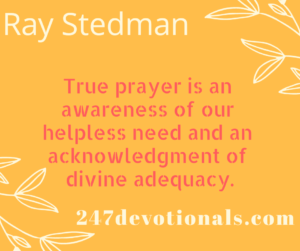Table of Contents
Topic:Believing Is Seeing
READ THE SCRIPTURE: HEBREWS 6:13-20
For when God made the promise to Abraham, since He could swear by no one greater, He swore by Himself, saying, I will surely bless you and I will surely multiply you. And so, having patiently waited, he obtained the promise.
Hebrews 6:13-15

Genesis records that God appeared to Abraham and made him a promise: Through your seed shall all peoples of the earth be blessed, (Genesis 22:17-18). The immediate seed was Isaac, born of Abraham’s old age; but the ultimate Seed is Christ. It is through faith in Jesus Christ that this promise is fulfilled, and all the peoples of the earth are blessed in Abraham. This promise was later confirmed by an oath, God swearing by himself that he would fulfill what he had said. The writer is simply pointing out that Abraham believed God’s promise and his oath.
Why did he believe it? Not because he immediately saw it fulfilled! There were twenty-five long, weary years before Isaac was born, and in the meantime, Abraham and his wife, Sarah, were growing older and had passed the time of life when it was possible to have children. Still the promise was unfulfilled. So, if Abraham did not believe it because he saw immediate results, then why did Abraham believe God’s promise? Abraham believed that God had told the truth about himself, and that God must be true to his own character which he had expressed through both the promise and the oath.
Without seeing any results for twenty-five years, Abraham hung on to the character of God. He never said to himself during that time, I’ve tried it and it doesn’t work, or I’ve got to convince myself that this is true, even though I secretly believe that it is not. He said, The God I know exists is the kind of a God who will do what he says he’ll do. For twenty-five years Abraham hung on to that promise. And he won!
I’ve heard it said about prayer, I’ve tried prayer but it doesn’t seem to work. It seems to me that is putting things the wrong way. That is really repeating the common myth of our day, seeing is believing. No greater lie was ever foisted upon the human race by the father of lies than this, that seeing is believing. We are utterly convinced that is the way to come to the knowledge of truth, but the man who sees no longer needs to believe. Faith is not sight, nor sight faith.
You ask why I believe in prayer? Well, not because I have tried it and it has worked. I believe in prayer because Jesus Christ says that prayer is the secret of life and I believe him. Jesus Christ says that man must either pray or faint, one or the other. Because it is Jesus Christ who says this, I believe him, and, therefore, I pray and find it works. The proof of prayer does not come from my experience; that is simply the demonstration of what I have already believed, and I believe it because of who said it. Believing, therefore, is seeing.
This is true on many levels of life. Albert Einstein did not come to the knowledge of relativity by performing a series of experiments which ultimately convinced him that relativity was true. He gradually saw the idea of relativity, and, convinced in his own mind that this was the secret of the physical universe, he performed experiments that he might demonstrate it to others. This is the way of truth. Believing is seeing.
This, therefore, is the secret of faith; it rests on the character of Jesus Christ. Either he is telling us the truth, and we can trust what this One who is like no one else who ever appeared in human history says to us, or we must reject him and repudiate him as a self-deceived impostor who attempted to foist some crude and foolish ideas upon the human race. That is where faith rests. From that ground everything must follow.
I remember, Lord Jesus, how many times you said to your disciples, O ye of little faith. I hear these words again in my own heart, Lord. Grant to me that I may have the courage to believe and to step out upon what I believe.
Life Application
Are our prayers faith-based? Is our faith based in our prayers, rather than the character of God to whom we pray? Are we learning to trust the wisdom of our Father in both answered and unanswered prayer?
